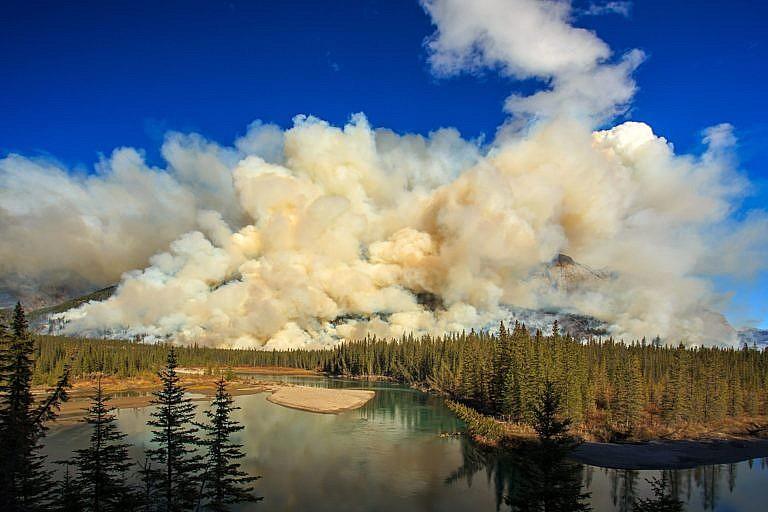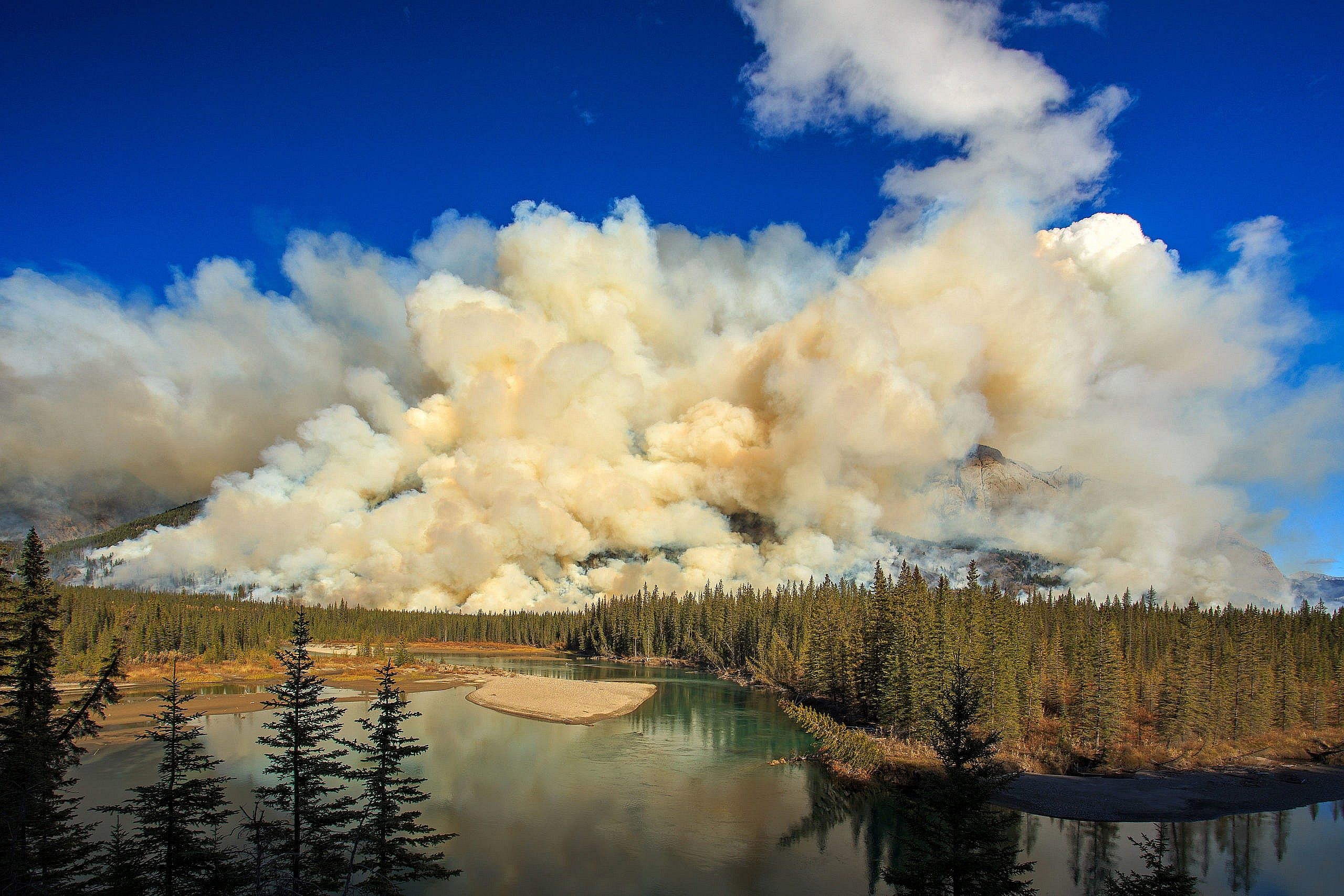How the wildfires are affecting our health
“We’re designed to fight bacteria and viruses. We can’t do smoke.”

Share

Looking at pictures of wildfires wreaking havoc across Canada is enough to make the average person feel a bit sick: the haze; the blood-orange sun; the gargantuan plumes of smoke. For those who do venture outdoors, there’s a general sense of unease, provoked by a faint, unsettlingly sweet smell in the air. The reason behind it all is an unusually early and out-of-control start to fire season, which many experts expect could be the country’s most devastating to date. Environment Canada has already issued “high risk” air quality warnings from coast to coast, and Canadians from B.C. to Halifax are breathing it all in.
Even if we can intuitively understand that all this smoke is bad for our health, it’s too early to tell just how bad the long-term effects will be. Michael Brauer, a researcher with the University of British Columbia’s School of Population and Public Health, has been studying the health impact of environmental phenomena for more than 25 years. And though the data on wildfires is sparse, it’s growing—and the prognosis is not good. For Canadians with pre-existing conditions, he says, living alongside frequent fires could be its own catastrophe. Here, Brauer explains what, exactly, everyone’s inhaling, how it’s affecting Canadians (physically and mentally) and how to stay healthy in a burning world.
You’ve been studying wildfires for a long time. How has the uptick in frequency changed the scope of your work in the last few years?
I was studying wildfires in Southeast Asia 25 years ago. At that time, wildfires weren’t really affecting any of our major cities in North America. It wasn’t until the early aughts that we started seeing bigger fires outside of rural areas in Canada, and in B.C. at least, we started seeing their health consequences on local communities. Now, most of Canada’s major cities are hit with the impacts of fire once or twice a year, if not multiple times. Even when things are relatively good fire-wise in B.C. and Alberta, we’d still be getting hit with smoke from California or Oregon. It’s just everywhere.
Another concerning issue is that Canada’s fire season has lengthened. Out west, it used to be July and August. But last year, there were fires in April. Vancouver now has smoke lingering in October, which is unprecedented. All of this means that the average person is experiencing greater levels of smoke exposure. And you don’t even need to be that close to a fire for that to happen; smoke can affect people thousands of kilometres away. I was talking to someone today from New York City, and the air was polluted there from a fire up here.
So it’s a good time for research, but a bad time in every other respect?
We don’t have a lot of data for how wildfire smoke affects us yet. When I started researching fires, we used to have to chase the smoke. Recently, it’s become relatively easy to study it.
What do we know about what happens inside the human body when someone inhales wildfire smoke?
Our bodies try to fight these airborne particles by mounting an inflammatory response, where our lungs call in all sorts of cells to try to digest these foreign materials. We’re evolutionarily designed to fight bacteria and viruses. We can’t do smoke particles. Our immune systems just keep working overtime, which can start to affect other organs, like the heart, brain and kidneys. It’s similar to gum disease, that long-term level of inflammation. The same thing happens when we’re exposed to this smoke.
So what you’re saying is that our bodies have evolved to respond to our environment—just not this level of environmental ruin.
It’s one thing to stand near a campfire every so often and get smoke in your eyes, which is very irritating. We can walk away from that; we can’t walk away from these fires. It’s getting to the point where you’re only going to be able to avoid them if you move somewhere else.
Is inhaling wildfire smoke somehow worse for the body than breathing in garden-variety summer smog?
It’s not clear that it’s worse than smog, but it’s just as bad. One of the main things I study is the impact of air quality on the body, and wildfire smoke is the main issue contributing to levels of air pollution in Canada right now. We can clearly see the negative effects of wildfire smoke on the lungs, but there was some hope that it wouldn’t be as severe as the impact of urban air pollution. More and more, the evidence is showing that it’s just as hazardous as pollution from traffic or industrial sources.
The difference between the types of smoke exists at the particle level. If we burn coal, it has a certain chemical signature. With wildfire smoke, the particles contain much more organic material, which is due to all the vegetation that’s being burned. The chemical makeup then reacts with the atmosphere, so the smoke composition changes the further it is from the fire source. When fires are smouldering, we actually tend to see more particles than if it’s burning very, very hot. It’s hard to generalize, but the real problem seems to be the intensity of the fires. In a typical polluted city, air quality doesn’t vary that much from one day to the next. In the case of wildfires, we get this sudden massive amount of smoke, with levels 50 or 100 times higher than what we’re used to.
Can you give me a real-life example of how this quick-onset intensity can be dangerous?
We know that air pollution can have effects on pregnancy, like lower birth weight and a greater likelihood of premature births. If a pregnant person is living in a city, they’re exposed to that every day. Now imagine that they’re living in a city that experiences a massive smoke episode because of a wildfire. If the smoke coincides with a critical window in that fetus’s development, that could be devastating.
Who else is especially vulnerable to a sudden smoke episode?
People with pre-existing conditions. A smoke episode can be a tipping point for people with a baseline level of sensitivity. For people with asthma, it can trigger an attack. Smoke can worsen the severity of chronic obstructive pulmonary disease, and can set off heart attacks and strokes. It can throw the bodies of diabetes patients out of whack. It can also worsen ear infections and cases of COVID and the flu. We know that generic forms of air pollution can lead to the development of these diseases, but we never used to worry about fires, which used to be a one-week event once a year. It’s not clear yet whether someone who lives in a place where they’re exposed to wildfire smoke every single year will have their life shortened.
I’d imagine that, as these fires approach major cities, there will be an issue with human-made structures burning—and the chemicals that they give off. Is that accurate?
At this point, it’s not a huge concern. By the time houses are burning, there are usually no people around to inhale that smoke. When it does become a concern is when people re-enter affected communities. Materials from burnt structures leave deposits in the ground. A few years ago, when the fire went through Fort McMurray, there was a lot of attention given to the soil—specifically, the heavy metals and plastics and electronics that were deposited in it. In these cases, it’s standard to do a lot of testing and remove about a foot of soil off the top as a precaution.
Aside from the physical effects, I’m sure all the scary visuals we’re seeing outside and on the news—the hazy skies, blurred sun—and general disaster-movie feel of things can’t be having a positive effect on Canadians’ mental and emotional wellbeing, right?
So far, the immediate effects of the fire are hurting a small number of people, but evacuations are a growing concern, especially among Indigenous communities. Evacuations can be very disruptive and cause long-standing mental-health issues—that upending of social structures, and having to stay stuck in a motel in Winnipeg for two months while homes are rebuilt. This is just anecdotal, but when we have major smoke events in Vancouver, you hear people talking about the apocalyptic feeling: of the orange clouds, of not being able to see the sun. It’s certainly not something that makes people happy, and I don’t want to say they’re complacent, but there’s less of a mental-health hit as people get used to the new reality—which is a sad thing. That said, there’s definitely a new uptick in climate anxiety, where people are not having children for fear of what kind of world they’d be bringing them into. We’ve also seen an increase in anxiety and exhaustion in health care workers because of fire events.
Even if we won’t understand the true damage of these smoke episodes on our bodies for a long time, what do you expect the toll will be on the health care system in the interim?
We’re already seeing that. During a smoke event, we experience increases in visits to ERs and family doctors, more hospitalizations and more prescriptions being filled. We’ve seen pharmacies in smaller communities run out of medications during smoke events. One of the things public-health organizations are really trying to communicate is how much of that is avoidable if people with pre-existing conditions manage their diseases in advance. Every spring, before fire season, we put out public service announcements that say things like, “Make sure you have enough medication on hand!” A lot still needs to be done in terms of just increasing public education so that people are prepared. But individuals can also take precautions in their own homes.
So it’s not a matter of learning to live with it—people can actually make moves to protect themselves?
Yes. We strongly recommend that people who have pre-existing conditions, are pregnant or have kids (and can afford it) get an air cleaner or better filtration system for their homes. If they can’t afford it, many cities have clean air shelters, which are usually community spaces where people can go to experience better air quality. These are mostly located out west, but I think people are going to become more aware of them in eastern parts of Canada soon.
That just goes to show that you really can’t escape the effects of a fire, even if you’re inside.
Being indoors helps, but closing up your windows without air conditioning, in a fire zone, can obviously be really hot.
This interview has been edited for length and clarity.